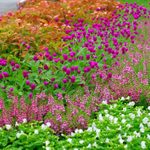What Are Heirloom Seeds?

Heirloom seed is not just a marketing term. Heirloom vegetable and flower seeds produce older varieties, grown successfully for generations.
Our editors and experts handpick every product we feature. We may earn a commission from your purchases.
Every spring I buy and sow seeds for ‘Green Arrow’ peas. Are they heirloom seeds? Yes! I’ll explain why below. They also qualify as “family heirlooms” because my dad taught me to grow this particular variety of peas.
On This Page
What Are Heirloom Seeds?
Depending on who you ask, the definition varies, but most gardeners agree the following characteristics:
- Open-pollinated: That means they’re naturally pollinated from plants of the same variety. or they self-pollinate. So when you save the seeds, you’ll get the same variety when you grow them the following season.
- Grown for at least 50 years: There’s some wiggle room here. Some count varieties as heirlooms if they’ve been grown for 40 years. Others insist they must have appeared before the 1940s. Suffice it to say, many generations of gardeners have grown heirloom varieties.
- Seeds handed down from one gardener to the next: Saving seeds was once more common than it is today. Gardeners regularly collected seeds from their favorite flowers and vegetables, shared them with others, then grew them again the next year.
Types of Heirloom Seeds
They break down like this:
- Family heirlooms: If your parents or grandparents were avid gardeners, you might be lucky enough to inherit seeds from plants they once grew. Or, like me, you know which varieties they grew and buy new seeds for those varieties every year.
- Historical heirlooms: An historic connection to a certain variety makes for great marketing. Many historical sites, including Colonial Williamsburg in Virginia, sell heirloom seeds reminiscent of what gardeners might have grown there.
- Regional heirlooms: Some varieties adapt well to specific regional climates. Organizations like Southern Exposure Seed Exchange sell open-pollinated varieties that do especially well in the Mid-Atlantic and Southeastern states.
- Heritage heirlooms: If you trace back your family history to other countries, you can also find heirloom varieties they might have grown, like Italian Ribbed Zucchini or Red Aztec Spinach. Then grow those in your garden.
Benefits of Heirloom Seeds
Heirloom seeds are fun to grow. Besides history, good memories and good taste, they provide another benefit — saving the bio-diversity of our vegetables and flowers for future generations.
Through organizations like the Seed Savers Exchange in Decorah, Iowa, gardeners worldwide are saving open-pollinated varieties of vegetables and flowers that might otherwise be lost from our world.
Can Hybrid Seeds be Heirlooms?
Hybrid varieties of flowers and vegetables are made by pollinating one plant with the pollen of another. The resulting seeds will not produce that same variety the following year. So while some hybrid varieties like Burpee’s Big Boy tomato have been grown since 1949, they aren’t true heirlooms. I buy seeds for this tomato each year because it’s a good variety.
Many hybrid varieties include “F1” at the end of their name.
How Long Do Heirloom Seeds Last?
If you store your seeds in a cool, dry and dark place that’s protected from insects and mice, heirloom seeds will last for several years, depending on the type.
Where To Buy Heirloom Seeds
They’re available online and at local garden centers. When searching seed companies like Burpee and True Leaf Market, include “heirloom” in your search so you get exactly what you want.
Some organizations like Southern Exposure Seed Exchange and Seed Savers Exchange only sell heirloom varieties. Baker Creek Heirloom Seeds is another source.
Many seed savers end up with more than they can possibly grow each year and are willing to share. You can find them through local garden clubs and online via social media. Even some public libraries free heirloom seeds in the spring to try in your garden.




